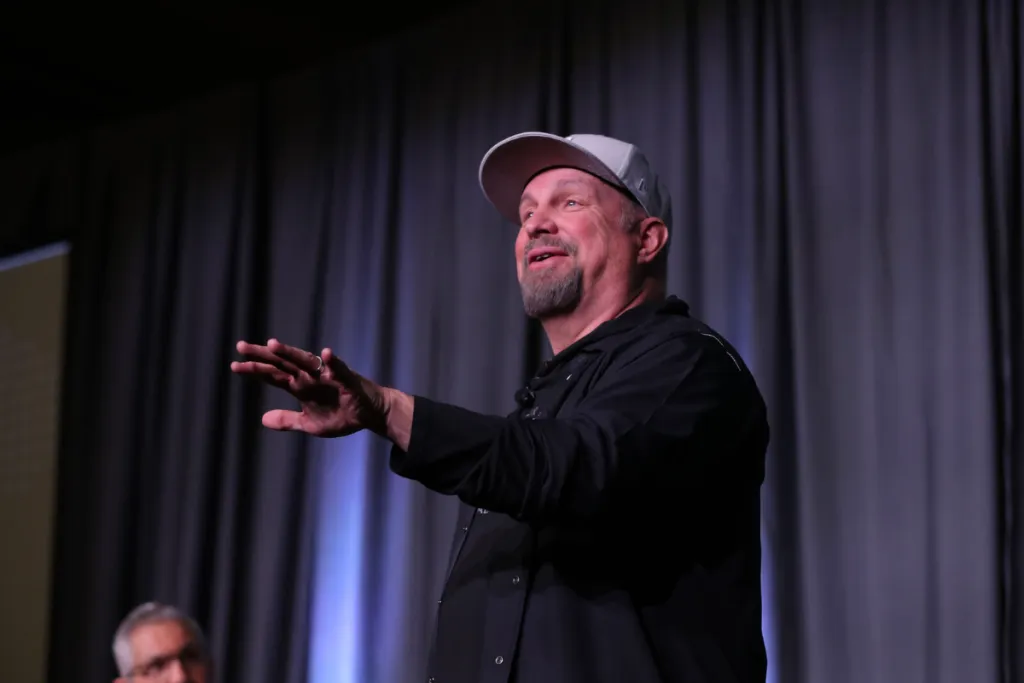
Garth Brooks at Country Radio Seminar (CRS) in Nashville on March 13th, 2023 (Photo Credit: CRS)
When it comes to streaming holdouts, Garth Brooks ranks as one of the biggest. But why has Garth steadfastly refused to allow his music on Spotify and Apple Music while exclusively licensing Amazon Music?
That was one of several questions fielded by the country superstar during an interview Monday at the Country Radio Seminar (CRS) in Nashville. For years, Garth Brooks flatly refused to license streaming platforms entirely, citing serious compensation issues and various misalignments in values.
That all changed in 2016, when Brooks inked an exclusive partnership with Amazon Music that remains active today. But despite heavy lobbying from mega-streamers Spotify and Apple Music (including direct pitches by Spotify CEO Daniel Ek himself), Brooks has refused to broaden beyond his Amazon streaming deal. Now, Garth Brooks has revealed more details on why that is.
“The fact is that Amazon is a retailer as well,” Brooks told CRS executive director RJ Curtis. “So you can sign your streaming deal, but part of that streaming deal is to move those physical units so the songwriters get paid. And people, we can talk all day that ‘Garth went on to raise his kids, what a great’— Garth did that for himself. I stick up for the songwriters because I’m freakin’ one of them! Everything I do for the songwriters, I do for myself.”
“I’m the most selfish guy you’ve ever met, okay? But if we don’t take care of these songwriters, what do you guys have to play? It’s just tough, so that’s why I love partnering with [Amazon]. So the physical comes in, and nobody’s doing physical anymore. So these songwriters are still doing well.
“And I hope that songwriters want to get a Garth Brooks cut. One, because I hope that they think that it would be cool. But two, right behind it closely, I hope it’s because they know that if you’re a Garth Brooks songwriter, you’re going to get paid.”
Speaking of songwriting, Brooks also tackled the tough topic of AI-generated music.
“Everything that is a blessing is a curse,” Brooks told Digital Music News’ Noah Itman. “And everything that is a curse is a blessing. Don’t forget that last half.”
Calling AI both “cool” and “scary,” Brooks questioned whether AI-generated music could supply deep-down human-driven emotion. But even on that point — like many others — he was completely unsure.
“It’s man against machine. So one thing that differentiates us from machines is the heart,” Garth mused. “But if an AI program writes a song that kills me, and makes me cry, isn’t that what songwriting is all about?”
Perhaps that level of sophistication will emerge in future AI generative versions. Or, perhaps not. “So when it’s John Henry versus the machine, don’t underestimate how powerful you are just as human beings against ratings, streaming numbers, and all that stuff. Don’t forget your gut, don’t forget what moves you.”
Perhaps the only answers at this stage are philosophical ones. “That’s the gift God gave you — was that gut,” Brooks continued. “To know when you hear something that’s going to make a difference. To make people laugh, to make people cry, to make people think. If AI gets to that level, I have to be thankful if I’m a fan that one of those songs touches.”
